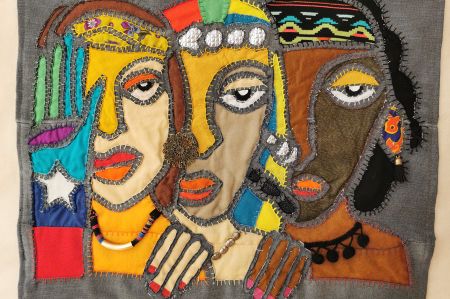De 1800 Roeden – cultural park in Amsterdam
- Written by Portal Editor
South American sounds came to our ears while we were setting up our tent at the “De Sport Camping” campsite, so we grabbed our bikes and went exploring as soon as we set up.
Not far from the campsite there is a huge cultural centre with various buildings and open spaces, an amphitheatre and workshops that are simply worth visiting. If you then, as we did in this case, also come across an event, a stroke of luck .... which should extend to a longer stay, because the hospitality of the Peruvians present was overwhelming, so that we stayed to eat.
Exiled Peruvians collect for the victims of oppression
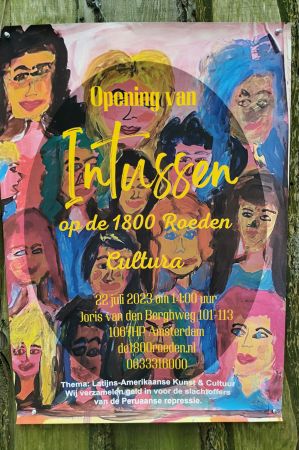 As part of a large cultural festival, numerous artists, dancers and musicians came together to present Peruvian culture and art, which is still suffering greatly from reprisals. As unfortunately in many countries, minorities are still oppressed and discriminated against. About half of the inhabitants of Peru are so-called "indígenas" members of one of the original ethnic groups - the Quechua or the Aymara. A third of Peruvians are mestizo, meaning they have their origins in indigenous culture as well as European culture (usually Spain). About ten percent are (more or less) original descendants of Spaniards. In addition, black, Chinese and Japanese minorities live in the country.
As part of a large cultural festival, numerous artists, dancers and musicians came together to present Peruvian culture and art, which is still suffering greatly from reprisals. As unfortunately in many countries, minorities are still oppressed and discriminated against. About half of the inhabitants of Peru are so-called "indígenas" members of one of the original ethnic groups - the Quechua or the Aymara. A third of Peruvians are mestizo, meaning they have their origins in indigenous culture as well as European culture (usually Spain). About ten percent are (more or less) original descendants of Spaniards. In addition, black, Chinese and Japanese minorities live in the country.
As part of the event, money was raised for the oppressed artists, and all money from the food and drinks sold was also donated.
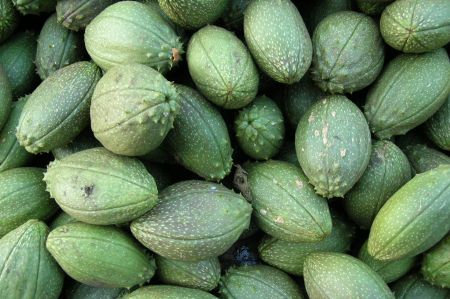 The Peruvian cuisine was always interesting and presented on site in a large selection, because it is strongly regional and can be roughly divided into the three regions of coast, mountains and rainforest. The main ingredients are rice, potatoes, sweet potatoes, yuca, corn and plantains. Seasoned generously with garlic and pepper. A typical coastal dish is ceviche, which consists of raw fish or seafood marinated in lime juice, onions and parsley, and served with sweet potatoes and corn. Cuy (guinea pigs) and alpaca are the specialties of the mountain regions, and in the rainforest, there are a wide variety of fruits and the so-called “jungle dumplings” – tachos – made from plantains, bacon, cassava and beans.
The Peruvian cuisine was always interesting and presented on site in a large selection, because it is strongly regional and can be roughly divided into the three regions of coast, mountains and rainforest. The main ingredients are rice, potatoes, sweet potatoes, yuca, corn and plantains. Seasoned generously with garlic and pepper. A typical coastal dish is ceviche, which consists of raw fish or seafood marinated in lime juice, onions and parsley, and served with sweet potatoes and corn. Cuy (guinea pigs) and alpaca are the specialties of the mountain regions, and in the rainforest, there are a wide variety of fruits and the so-called “jungle dumplings” – tachos – made from plantains, bacon, cassava and beans.
In addition, music and art from Peru were presented as part of the cultural festival, and people were repeatedly asked to go to the amphitheatre, where various dance performances by heavily costumed dancers presented their skills, as the inserted pictures show. But now back to the cultural centre.
Even the naming is an interesting aspect
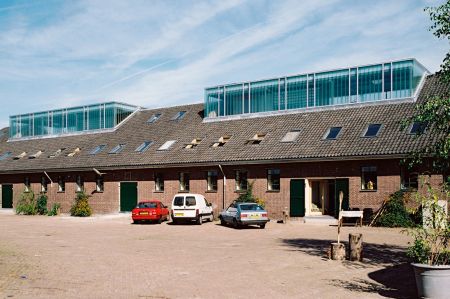 The name of the De 1800 Roeden complex is based on its distance from the Haarlemmerpoort, as until 1870 it was the western border of Amsterdam. Since 1632, the canal to Haarlem has run from this gate, along which a towpath runs.
The name of the De 1800 Roeden complex is based on its distance from the Haarlemmerpoort, as until 1870 it was the western border of Amsterdam. Since 1632, the canal to Haarlem has run from this gate, along which a towpath runs.
In 1767 this sandy path was paved, which became today's Haarlemmerweg. Buildings along this street were marked with the distance outside the city. An Amsterdam roe corresponded to 3,767 meters. The 1800 Roeden is therefore 6,780 meters or almost seven kilometres west of the Haarlemmerpoort.
The facility as an artillery store
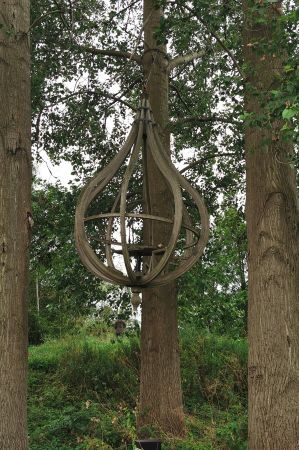 The Roeden from 1800 was part of the defence line of Amsterdam as an ammunition depot. The defence complex at Haarlemmerweg was built between 1870 and 1910. The purpose of the complex was: "Storage of ammunition and explosives for the Sloten sector". The locally used name Het Kruithuis still commemorates this function today.
The Roeden from 1800 was part of the defence line of Amsterdam as an ammunition depot. The defence complex at Haarlemmerweg was built between 1870 and 1910. The purpose of the complex was: "Storage of ammunition and explosives for the Sloten sector". The locally used name Het Kruithuis still commemorates this function today.
After the Second World War, the facility served as an artillery storage facility. The complex consists of six brick buildings A to F and was used until 1984. The military function ended in 1994 and the site was given to artists and theatre groups, among others, who stored their belongings there. After the complex was sold to Jan van Muiden and Henk Willem Spruit in 1996, the halls were renovated and used as an atelier, studio and workshop. Two halls have a private catering function. In 1996, Hall A was inscribed on the UNESCO World Heritage List and National Monuments List as part of De Stelling van Amsterdam.
In later years, four more halls were added in the same style, but - with the exception of Hall E - equipped with a steel-concrete roof construction. In addition, two niche huts made of masonry steel were built. The complex also included a residential building, which was demolished in the 1980s.
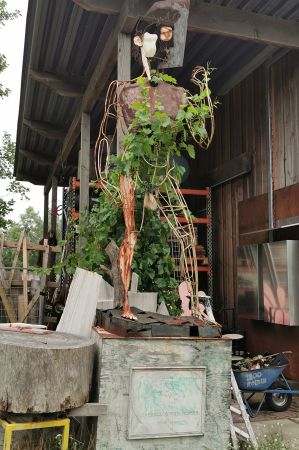 This former ammunition depot is located in the middle of nature on the western edge of Amsterdam. This very characteristic and green area offers a unique breeding ground for artists and small businesses that produce special products. Artists, traditional handicrafts, design agencies, sound artists, photographers, furniture makers, event agencies, an amphitheatre and a special gastronomy find a new home here. The amphitheatre was built in a very special way: a cavity wall for bats, cracks and holes in the brickwork for colonizing larger and smaller animals, and the possibility for plants to settle between the joints make this theatre a valuable natural element.
This former ammunition depot is located in the middle of nature on the western edge of Amsterdam. This very characteristic and green area offers a unique breeding ground for artists and small businesses that produce special products. Artists, traditional handicrafts, design agencies, sound artists, photographers, furniture makers, event agencies, an amphitheatre and a special gastronomy find a new home here. The amphitheatre was built in a very special way: a cavity wall for bats, cracks and holes in the brickwork for colonizing larger and smaller animals, and the possibility for plants to settle between the joints make this theatre a valuable natural element.
There are characteristic halls on the site, which are rented out as commercial premises, modern offices, studios and workshops. In addition, our site has an amphitheatre that can be rented for various festivities. The open-air amphitheatre is ideal for performances, workshops and many other festive purposes. One of the most important wishes and conditions of the owners is the natural layout of the plot. The green plan strives for as much variety and diversity as possible. Various places have emerged that offer space for different (sometimes almost extinct) native animal species.
To the fauna and flora of "De 1800 Roeden"
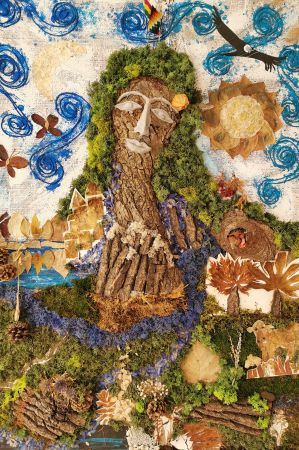 In order to give the fauna as much chance as possible, there is a comprehensive and gradual mowing management. Where once a neglected bed of poplars blew in the wind, a wide variety of trees have now been planted. The undergrowth consists mainly of native species. By bringing the surrounding water into the site at several points, there are even more opportunities for nature. This has also made the site attractive to birds and many other animals. In the meantime, there is also a lot of edible food in this special piece of nature. Here's a request from the owner:
In order to give the fauna as much chance as possible, there is a comprehensive and gradual mowing management. Where once a neglected bed of poplars blew in the wind, a wide variety of trees have now been planted. The undergrowth consists mainly of native species. By bringing the surrounding water into the site at several points, there are even more opportunities for nature. This has also made the site attractive to birds and many other animals. In the meantime, there is also a lot of edible food in this special piece of nature. Here's a request from the owner:
Go on a scavenger hunt for wild rocket, canola, figs, apples, pears, hazelnuts, rose hips and blackberries. In addition, all sorts of goodies are grown in the vegetable gardens and there is even a hidden beehive that has already yielded a few jars of delicious honey.
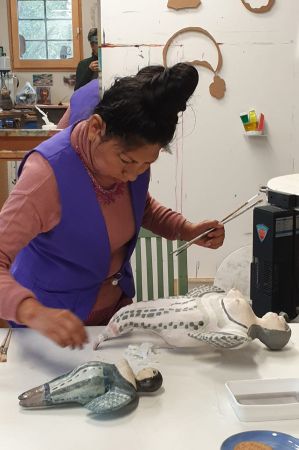 When using and selecting the materials, care is taken to have as little impact on the environment as possible. When building and designing the site, we always strive for added value for nature. The sound barrier made of logs. It will decay over time. Plants and animals will colonize this “wall”. The secretion is absorbed and utilized by nature.
When using and selecting the materials, care is taken to have as little impact on the environment as possible. When building and designing the site, we always strive for added value for nature. The sound barrier made of logs. It will decay over time. Plants and animals will colonize this “wall”. The secretion is absorbed and utilized by nature.
With the laptop in the orchard, at a meeting by the water or sculpting in the open air. This is the 1800 Roeden. As soon as you enter the site, you can feel the atmosphere of a breeding ground. The diverse planting in combination with natural materials has created a place that exudes a pleasant calm. The nut grove, the hill, the beehive, the vegetable gardens and the hidden crawl ways invite you to a variety of experiences. We find a very inspiring working environment.
The 1800 Roeden is exciting and relaxing at the same time, it never gets boring! We loved it!
Please read as well:
Main Cycle Path - from Albertshofen to Marktsteft
Bergwitzsee Camping - location for blogger and TV
-
 De 1800 Roeden – Cultural Center Amsterdam
De 1800 Roeden – Cultural Center Amsterdam
De 1800 Roeden – Cultural Center Amsterdam
De 1800 Roeden – Cultural Center Amsterdam
-
 De 1800 Roeden – Cultural Center Amsterdam
De 1800 Roeden – Cultural Center Amsterdam
De 1800 Roeden – Cultural Center Amsterdam
De 1800 Roeden – Cultural Center Amsterdam
-
 De 1800 Roeden – Cultural Center Amsterdam
De 1800 Roeden – Cultural Center Amsterdam
De 1800 Roeden – Cultural Center Amsterdam
De 1800 Roeden – Cultural Center Amsterdam
-
 De 1800 Roeden – Cultural Center Amsterdam
De 1800 Roeden – Cultural Center Amsterdam
De 1800 Roeden – Cultural Center Amsterdam
De 1800 Roeden – Cultural Center Amsterdam
-
 De 1800 Roeden – Cultural Center Amsterdam
De 1800 Roeden – Cultural Center Amsterdam
De 1800 Roeden – Cultural Center Amsterdam
De 1800 Roeden – Cultural Center Amsterdam
-
 De 1800 Roeden – Cultural Center Amsterdam
De 1800 Roeden – Cultural Center Amsterdam
De 1800 Roeden – Cultural Center Amsterdam
De 1800 Roeden – Cultural Center Amsterdam
-
 De 1800 Roeden – Cultural Center Amsterdam
De 1800 Roeden – Cultural Center Amsterdam
De 1800 Roeden – Cultural Center Amsterdam
De 1800 Roeden – Cultural Center Amsterdam
-
 De 1800 Roeden – Cultural Center Amsterdam
De 1800 Roeden – Cultural Center Amsterdam
De 1800 Roeden – Cultural Center Amsterdam
De 1800 Roeden – Cultural Center Amsterdam
-
 De 1800 Roeden – Cultural Center Amsterdam
De 1800 Roeden – Cultural Center Amsterdam
De 1800 Roeden – Cultural Center Amsterdam
De 1800 Roeden – Cultural Center Amsterdam
-
 De 1800 Roeden – Cultural Center Amsterdam
De 1800 Roeden – Cultural Center Amsterdam
De 1800 Roeden – Cultural Center Amsterdam
De 1800 Roeden – Cultural Center Amsterdam
-
 De 1800 Roeden – Cultural Center Amsterdam
De 1800 Roeden – Cultural Center Amsterdam
De 1800 Roeden – Cultural Center Amsterdam
De 1800 Roeden – Cultural Center Amsterdam
-
 De 1800 Roeden – Cultural Center Amsterdam
De 1800 Roeden – Cultural Center Amsterdam
De 1800 Roeden – Cultural Center Amsterdam
De 1800 Roeden – Cultural Center Amsterdam
https://www.alaturka.info/en/bicycle-travelling-e-bike-camping/6219-de-1800-roeden-a-cultural-park-worth-seeing-in-amsterdam#sigProId1530743c4a
